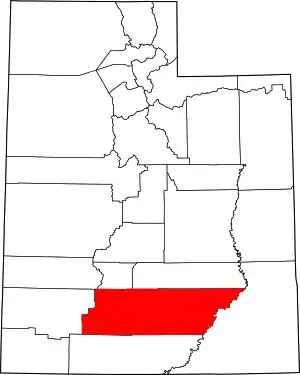Cannonville, Utah
Cannonville is a town in Garfield County, Utah, United States, along Utah Scenic Byway 12. As of the 2010 census, the population was 167,[5] up from 148 at the 2000 census.
Cannonville, Utah | |
|---|---|
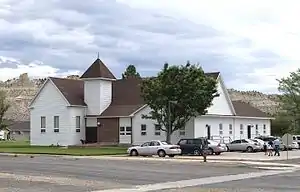 LDS church in Cannonville | |
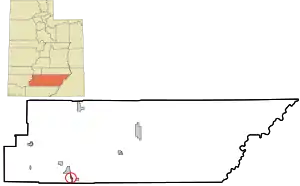 Location in Garfield County and state of Utah | |
| Coordinates: 37°34′0″N 112°3′6″W | |
| Country | United States |
| State | Utah |
| County | Garfield |
| Founded | 1874 |
| Incorporated | 1934 |
| Founded by | James L. Thompson |
| Named for | George Q. Cannon |
| Government | |
| • Mayor | Alma Fletcher |
| • Clerk | Tom Shakespear |
| Area | |
| • Total | 2.57 sq mi (6.65 km2) |
| • Land | 2.57 sq mi (6.65 km2) |
| • Water | 0.00 sq mi (0.00 km2) |
| Elevation | 5,886 ft (1,794 m) |
| Population (2010) | |
| • Total | 167 |
| • Estimate (2019)[2] | 173 |
| • Density | 67.42/sq mi (26.03/km2) |
| Time zone | UTC-7 (Mountain (MST)) |
| • Summer (DST) | UTC-6 (MDT) |
| ZIP code | 84718 |
| Area code(s) | 435 |
| FIPS code | 49-10330[3] |
| GNIS feature ID | 1426344[4] |
History
Cannonville was laid out in 1874.[6] A post office called Cannonville was established in 1879, and remained in operation until 1966.[7] The community bears the name of George Q. Cannon, a Mormon official.[8]
Geography
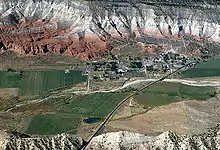
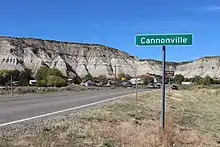
Cannonville is located near the southern border of Garfield County, in the valley of the Paria River. Via State Route 12 it is 3.5 miles (5.6 km) east to Henrieville and 5 miles (8 km) north to Tropic. Bryce Canyon National Park is 6 miles (10 km) in a straight line to the west, 16 miles (26 km) by road.
According to the United States Census Bureau, the town has a total area of 2.0 square miles (5.1 km2), all land.[5]
Climate
The climate in this area features a large daily and annual temperature range, with cold, dry winters and hot summers. Rainfall is highly seasonal, with most precipitation falling during the late-summer monsoon season, and an average annual precipitation of nine inches. According to the Köppen Climate Classification system, Cannonville has a hot and cold arid desert climate, abbreviated "BWk" on climate maps.[9]
Demographics
| Historical population | |||
|---|---|---|---|
| Census | Pop. | %± | |
| 1880 | 137 | — | |
| 1890 | 273 | 99.3% | |
| 1900 | 211 | −22.7% | |
| 1910 | 219 | 3.8% | |
| 1920 | 311 | 42.0% | |
| 1930 | 227 | −27.0% | |
| 1940 | 250 | 10.1% | |
| 1950 | 205 | −18.0% | |
| 1960 | 153 | −25.4% | |
| 1970 | 113 | −26.1% | |
| 1980 | 134 | 18.6% | |
| 1990 | 131 | −2.2% | |
| 2000 | 148 | 13.0% | |
| 2010 | 167 | 12.8% | |
| 2019 (est.) | 173 | [2] | 3.6% |
| U.S. Decennial Census[10] | |||
As of the census[3] of 2000, there were 148 people, 50 households, and 41 families residing in the town. The population density was 119.9 people per square mile (46.5/km2). There were 60 housing units at an average density of 48.6 per square mile (18.8/km2). The racial makeup of the town was 95.27% White, 0.68% Pacific Islander, 3.38% from other races, and 0.68% from two or more races. Hispanic or Latino of any race were 4.05% of the population.
There were 50 households, out of which 42.0% had children under the age of 18 living with them, 66.0% were married couples living together, 14.0% had a female householder with no husband present, and 18.0% were non-families. 18.0% of all households were made up of individuals, and 16.0% had someone living alone who was 65 years of age or older. The average household size was 2.96 and the average family size was 3.34.
In the town, the population was spread out, with 33.8% under the age of 18, 6.8% from 18 to 24, 19.6% from 25 to 44, 20.3% from 45 to 64, and 19.6% who were 65 years of age or older. The median age was 38 years. For every 100 females there were 117.6 males. For every 100 females age 18 and over, there were 96.0 males.
The median income for a household in the town was $28,750, and the median income for a family was $32,250. Males had a median income of $23,750 versus $12,083 for females. The per capita income for the town was $11,481. None of the families and 3.7% of the population were living below the poverty line, including no under eighteens and 10.9% of those over 64.
See also
- List of towns in Utah
References
- "2019 U.S. Gazetteer Files". United States Census Bureau. Retrieved August 7, 2020.
- "Population and Housing Unit Estimates". United States Census Bureau. May 24, 2020. Retrieved May 27, 2020.
- "U.S. Census website". United States Census Bureau. Retrieved 2008-01-31.
- "US Board on Geographic Names". United States Geological Survey. 2007-10-25. Retrieved 2008-01-31.
- "Geographic Identifiers: 2010 Demographic Profile Data (G001): Cannonville town, Utah". U.S. Census Bureau, American Factfinder. Retrieved March 28, 2017.
- The Utah Genealogical and Historical Magazine, Volumes 9-10. 1918. p. 81.
- "Garfield County". Jim Forte Postal History. Retrieved 18 October 2015.
- Van Atta, Dale (Jan 22, 1977). "You name it - there's a town for it". The Deseret News. p. 15. Retrieved 18 October 2015.
- Climate Summary for Cannonville, Utah
- "Census of Population and Housing". Census.gov. Retrieved June 4, 2015.
